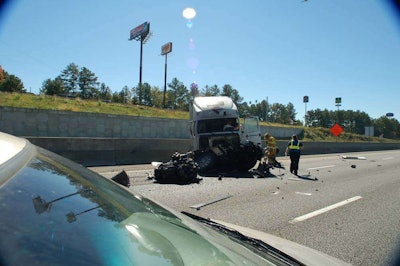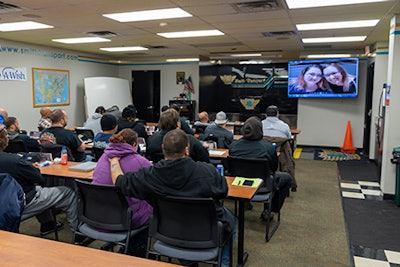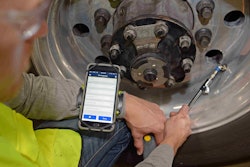
 Steve Bryan, executive vice president and general manager of Samba Safety.
Steve Bryan, executive vice president and general manager of Samba Safety.About two weeks ago, rising insurance costs and truck crashes with “nuclear” jury verdicts in excess of $10 million was the top-of-mind issue for fleet owners and executives.
“None of us were talking about Coronavirus,” said Doug Marcello, a trucking defense attorney with the law firm Marcello & Kivisto in Carlisle, Penn.
Marcello took part in a 20-minute video conference call Thursday, hosted by Samba Safety’s Executive Vice President Steve Bryan, part of a weekly video conference series with thought leaders to have a “casual conversation about things we think are important to the transportation industry.”
During the COVID-19 outbreak in the United States, courts have been limiting their activities only to emergency situations. Trucking and insurance companies are not settling accident cases at the moment, he said, but compared the the court system to a crimped hose.
Very little water is coming out of the end now, but “when it opens up, there will be a deluge,” he said, adding that the cash flow of plaintiff attorneys is based on the settlement of cases. When courts open up again, he expects them to “put their foot on the pedal.”
Click here to view our full coverage of the coronavirus' impact on the trucking industry from the leading industry publications of Commercial Carrier Journal, Overdrive, Truckers News and Trucks, Parts, Service.
“People need money and will pursue these claims more than they had in the past,” Marcello said.
On the bright side, the COVID-19 pandemic has improved the public image of the trucking industry from that of drivers running over hours, to drivers being the first responders who bring food and medical supplies to communities.
“I think this is an opportunity for America to recognize we are the lifeblood,” he said. Public perception is important, he said, since future jurors will be influenced by the positive media they are currently consuming.
“Once we get back, I think the jury pool will have a much greater appreciation for drivers for what they do,” he added. “This can only help to give us a positive perception and move us away from the Smokey and the Bandit days. Drivers are professionals who are risking their lives and making sure we have what we need in today’s economy.”
 Steve Bryan and Doug Marcello agreed the COVID-19 pandemic has positively improved the public’s perception of the trucking industry, which could help win over jurors in future court cases.
Steve Bryan and Doug Marcello agreed the COVID-19 pandemic has positively improved the public’s perception of the trucking industry, which could help win over jurors in future court cases.As an executive member of Trucking Moves America Forward, Bryan said the COVID-19 pandemic has done more to improve the public image of the industry than anything he has seen in the past two years.
“Truckers have become the hero of the day,” he said.
Marcello and Bryan commented on a recent study from the American Transport Research Institute (ATRI) that found the average speeds of trucks have increased at major congestion points in the country during the past week. The data shows positive gains for the industry from passenger vehicles staying at home to comply with shelter-in-place rules for COVID-19.
The data collected by ATRI and other groups during the COVID-19 period will prove useful, they agreed, for endorsing new investments in infrastructure to decrease the cost of transportation, to reduce accidents and help alleviate the driver shortage.
Truck crash rates have been increasing over the past decade, after a decrease in accidents following the economic collapse in late 2008. When the economy picked back up in 2010, the number of accidents with injuries and fatalities began rising again, Bryan noted.
Alleviating congestion, as COVID-19 has done, will show the safety impact. Going forward, the reduction of truck accidents during the pandemic is something “we can take a closer look at,” Bryan said.
Marcello said another positive from the COVID-19 could be the realization by attorneys that they do not need to travel to do depositions.
“All we really need is cell phone with FaceTime. It saves me a lot of time, it is efficient and saves money for clients,” he said.
The two thought leaders also discussed the increased demand for home delivery. Companies that offer final-mile delivery services are hiring more non-CDL drivers. They both worried about legal problems companies will have with untrained drivers, and stressed the need for more training and monitoring of driver safety data.
At the conclusion of the video conference, Marcello answered a question about the Federal Motor Carrier Safety Administration’s suspension of hours-of-service regulations for certain loads, such as food and medical supplies. He stressed the need for carriers to annotate and document HOS violations in their ELD system to safeguard their companies against plaintiff attorneys, who may look for logbook irregularities in future accident cases.











